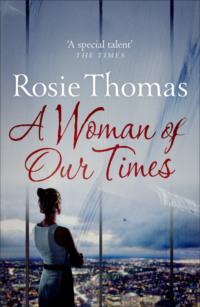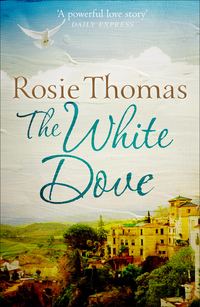
Полная версия
If My Father Loved Me
We failed each other, I said, I you and you me, but it was not a failure on such a scale that we are apart now, today of all days.
I was still sitting there, caught up in my inner conversation, when the driver climbed back into his seat. He tooted his horn at me as he rolled away and at once I jerked back into ordinary awareness. I should be sitting at my father’s bedside instead of hovering out here with my mind freewheeling in space. I hurried across the car park and in through the revolving doors, past the coffee shop and gift stall, and took the lift up to the ward. In the airless, medical-scented atmosphere I already felt as if I had been at the hospital for days.
Ted was still asleep. His mouth had fallen open and his breath clicked faintly in his throat. I took my seat once more beside him but didn’t try to hold his hand in case I disturbed him.
The hours passed slowly. The nurse who looked in from time to time explained that he was connected up to monitors that were watched over at the nurses’ station. He was stable, he said, at present.
At the distant end of the afternoon Lola appeared. In this stuffy room my daughter looked supernaturally beautiful and healthy, with her bright eyes and polished skin, as if all the threats of mortality had been airbrushed out of her face. I clung briefly to her, breathing in her sweet and perfectly familiar smell. Jack sidled in in her wake. He edged round the bed and, after a quick glance at Ted, leaned his forehead against the window and stared out. I hugged him too and he submitted briefly, although I could still feel the tense curve of his body arching away from me.
‘Have you had something to eat?’ I asked him.
‘Yeah. Lo fixed me a sandwich. I ate it in the car.’
The red chair was the only one. Lola went out to the main ward and borrowed another. She handed me a bag of apples and took a framed photograph out of her nylon rucksack. It was of herself and Jack and me, taken on last year’s summer holiday in Devon, the one that usually stood on the dresser in our kitchen. For once we were all smiling, looking straight into the camera, and now I noticed that each of us had a variation of Ted’s strong features overprinted on our own. She placed the picture on Ted’s locker, angled so that he could see it when he woke up. ‘I thought he might like it,’ she said, ‘if he wakes up when we aren’t here.’
The love implicit in the simple gesture touched me and I felt sorry that I hadn’t thought of it myself. ‘A very good idea.’
‘We’re all he’s got,’ she said matter-of-factly and this was the truth. There was no wife, not even an auntie, now, if you didn’t count Jean Andrews. I didn’t know who Ted’s friends were, if there were any remaining.
‘How is he?’
Out of the corner of my eye I saw Jack’s head half turn at Lola’s question. He wanted to hear but didn’t want me to see him listening.
‘Holding his own,’ I said. I was afraid that even though he seemed to sleep, he might hear what we were saying. I would tell them Dr Bennett’s verdict later, out of Ted’s earshot.
Lola nodded. ‘Go and get a cup of tea, Mum and eat some fruit. I’ll be here.’
‘Do you want to come with me, Jack?’
‘No,’ he said.
I carried a polystyrene cup of tea out into the car park and sat in my place on the wall, sipping the tea and eating an apple. The traffic was heavier now, with after-work visitors arriving and a short line of cars waiting for a free slot built up at the entrance. I tried to recapture some of the comfort of my earlier unspoken dialogue with Ted, or even the sense that with the dying and the newborn and the passers-through we were part of a generous community, but there was nothing. I felt lonely and sad for him, and disappointed in myself.
But there’s still time, I thought. I can still reach him.
‘He woke up,’ Lola said when I reached the ward again.
‘Yes?’
‘We chatted for a bit, Jack, didn’t we?’
‘Yeah. He asked Lo about uni and me about school. He was okay. Then he just sort of shut his eyes and went to sleep again. He didn’t see the photo, though.’
This was a long speech for Jack. Hope began sliding through my veins. Outside on the main ward there were relatives gathered round the beds of the old men, two nurses were pushing a trolley loaded with pill bottles and checking lists of medication, and a woman in a green overall was offering tea and biscuits. It wasn’t over. In a week, maybe, Ted would be sitting up too and choosing a biscuit from the Tupperware drum. In another week or two I could be driving him home. I would bring him back to my house and slowly, slowly, we would learn a new language for each other. I could tell him that he had made me suffer when I was too young to deserve such treatment and he could explain to me what had made him do it. We would listen to each other and make sense of the unintelligible, and then slowly stitch up the weave of forgiveness.
Anything was possible. Everything was possible.
The three of us settled round his bed. On one side Lola stroked his hand and talked to him about her house-share friends at university, young people he had never heard of let alone met. She talked easily and I knew that Ted would like the sound of her voice with its regular gurgles of laughter. Jack flitted around the room. He leaned on the windowsill for long minutes and watched the birds coming to roost among the huge metal cylinders on the hospital roof, then turned away to pick with his thumbnail at a leprous patch of paint on the bed end. I sat still and watched the rise and fall of Ted’s chest. It already felt like routine to be sitting here. Was it only yesterday at this time that I had been walking through the shimmering evening to meet Mel?
Time passed slowly. The ward quietened as the visitors drifted away. I was half expecting it, but no one came to tell us it was time to leave. A new nurse, just arrived on night duty, came in to introduce herself and to change one of the packs of fluid that drained into Ted’s arm.
‘How is he?’ I asked softly, thinking of the monitors at the nursing station.
‘There’s no change.’
That meant there was no deterioration. I smiled my leaping gratitude at her.
At nine o’clock I told Lola and Jack that they should go home. It was over an hour’s drive and Jack had school in the morning.
‘Aren’t you coming?’ Jack asked.
‘I’ll stay here a little longer. Lola will see you into bed.’ I glanced at her over his head and she nodded. ‘Or if you’d rather, you can go to Caz and Graham’s.’
‘No,’ Jack said at once.
Lola bent over and kissed her grandfather’s forehead, then touched her fingertips to his lips. ‘See you later, Grandad,’ she whispered.
Jack touched the small steeple of bedclothes over his feet and snatched his hand back. ‘Bye,’ he mumbled. He followed his sister to the door and then hovered, torn between the impulse to rush back to Ted’s side and the need to keep his own distance from me and his sister. Sometimes Jack was so transparent I thought I could read his hurt and put everything right for him so easily; at others I was afraid I hardly knew him. ‘Bye,’ he said again. Lola was leading and he followed her.
‘Drive carefully,’ I warned automatically. ‘I love you both.’
‘Yes, Mum.’
I sat down yet again. An hour dragged by and Ted rolled his head on the pillows and feebly shifted his legs. The Night Sister suddenly appeared with the first nurse. They moved rapidly around him, checking his fluids, and the tubes and wires that led into him, and calling him by his name.
‘What’s happened? What’s wrong?’ My voice was sharp and loud.
‘There are some new signs. The doctor’s coming.’
I was squeezed out of my place at his side. Ted’s eyes were wide open now and I could see how much it hurt him to breathe.
‘Dad? Dad, I’m here … I …’
I couldn’t finish what I was saying because the doctor arrived and I was edged further away to make room for him. I stood obediently outside the room with my arms wrapped round my chest. The old men were mostly asleep although pools of light lapped one or two of the beds. I waited until the doctor came out again. He was wearing a dark-blue shirt under his white coat and a name tag that read Dr Raj Srinivasar. I saw all this in a split second. He indicated that we should step a little distance away.
‘Doctor?’
‘I’m sorry. The undamaged portion of your father’s heart muscle has been working very hard since the attack and we have been helping him as far as possible with drugs to stimulate the heart’s natural rhythm. But I am afraid even this is gradually failing him now. I think Dr Bennett explained?’
I bent my head. ‘Yes.’
It had been human but utterly vain to hope, of course. I wanted the doctor to go away and take the nurses with him, and leave the two of us together. Dr Srinivasar knew this, because when I had composed my face and turned back to Ted he was lying quietly, alone again, under a dim light. I closed the door of the little room and took my place in the chair once more. I thought there were fewer wires clipped to him now and the levels of liquid in the bags hanging over his head didn’t change.
He was awake and he didn’t look as if he was in pain. Keeping him comfortable, Dr Bennett called it. Ted licked his lips and his neck muscles worked as if to squeeze words out of his ruined heart. ‘You’ve been a good girl,’ he whispered.
Automatically, defensively, keeping my long-learned distance I muttered, ‘Not really.’
I wasn’t ready for Ted’s praise and in my unpreparedness I couldn’t have assured him in return that he had been a good father.
I would have snatched my answer back if only I could, but Ted surprised me. He let his head fall further back against the pillows and laughed. It was a small coughing echo of his old laugh, but still there was no mistaking it. He said one more thing after that, on a long breath. I thought it was ‘my girl’.
As the minutes ebbed and I waited I knew that now it was too late for us to make our spoken allowances to each other. He lay with his eyes closed and the rise and fall of his chest grew shallower until I could no longer see it. I pressed my face against his cheek. Tears began to run out of my eyes and into the sheet. I put my arm under his shoulder as if I were going to lift him up and held him close against me. If I could have lifted him properly and carried him across the divide before laying him down again to rest, I would have done it. As I wept I told him, the angry words and the bitter words threading with the words of love, that I loved him and I hated the childhood he had given me, and I would always love him. He didn’t answer and I didn’t expect him to. I knew that he was dead.
I sat with him for a little while; then there seemed no point in staying when Ted himself had gone. I took the framed photograph off the locker and tucked it under his arm where he could hold it close to his heart. Then I kissed him on the forehead and touched his lips with my fingers, as Lola had done. I closed the door of the room very quietly.
Dr Srinivasar and the Night Sister were waiting for me.
‘I’m sorry,’ the doctor said. He shook my hand, very formally.
‘Thank you,’ I said.
The Sister put her arm round my shoulders and led me into the empty visitors’ room. ‘Would you like to sit in peace for a while? Let me bring you a cup of tea?’
I shook my head. ‘No, thank you, Sister.’
‘There is a chapel in the hospital.’
I shook my head again. Ted had never been very godly and I took after him.
There was only one place I wanted to be and that was at home. We established that I would come back to complete the formalities relating to the death and I thanked her for everything that had been done for my father. I went out once more to the car park, now deserted under a heavy dark sky, climbed into my car and drove back dry-eyed to London.
Lola was waiting up for me. I told her that Ted Thompson was dead, then we sat down and cried for him together.
Three
The room was light and bare, with tall, plain windows. Rows of wooden seats faced a pair of non-committal flower arrangements on either side of a secular-looking lectern. The atmosphere was subdued, naturally enough, but also utilitarian. The light-wood coffin under a purple drape was utilitarian too, which was inappropriate for Ted, whose life had been many things but never that. And at the same time as I was thinking about the crematorium chapel and the flowers, and the coffin I had selected with the undertakers’ discreet guidance, I was also reflecting that Ted wouldn’t have cared what arrangements were made for his funeral. Or would have affected not to.
‘I haven’t got to sit through it, have I?’ I could hear him snort in the half-irritable, half-jovial way that he adopted in his later years. ‘Just do the necessary and make sure all and sundry get a drink at the end of it.’
I also wondered how abnormal it was to be standing at a funeral and thinking like this. But then our life together, Ted’s and mine, hadn’t been usual. Mel’s family had been normal, or Caz’s, or Graham’s. Not ours.
Mel was sitting a few seats behind me. She had never met Ted, but she insisted that she wanted to come, out of respect and to keep me company. Caz and Graham were with her. They had met him a handful of times, at my wedding and the children’s birthday parties, and the occasional Christmas celebration in the intervening years.
‘I liked your dad. Of course I’m coming to his funeral,’ Caz declared.
Ted had liked her, too. I remember him flirting with her at my wedding reception. He had probably cornered her in some alcove, before cupping her round face between his two hands and breathing in the scent of her skin as if she were some exotic flower. ‘I could create such a perfume for you,’ he would have murmured in her ear. This routine worked like a charm with a surprisingly wide range of women. Not with Caz, of course, although it would have been a matter of pride for him to have a go. But with plenty of others. More than I could or would want to remember.
Lola and I sat on either side of Jack in the front row of seats. Lola was wearing black trousers and a tight red jersey that made her glow like a damask rose in the colourless desert of the chapel.
Rosa damascena, from which the essential perfume oil attar of roses is distilled. In Bulgaria, principally. I was surprised by how much I remembered about Ted’s craft.
Lola blotted her tears with a folded Kleenex and glanced down at the two black feathered wings of mascara printed on the tissue. Jack sat upright and stared straight ahead of him, dressed in a tidied-up version of his school uniform.
When I broke the news to him, on the morning after Ted’s death, he said, ‘I see.’ And after a moment’s thought, ‘It’s very final, isn’t it?’
‘Yes. Although he’s still here in a way, because we remember him and because we’ll go on talking about him as long as we are alive.’
Jack gave me one of his withering looks, as if he saw right through this threadbare platitude, but he didn’t pass any comment.
Apart from the six of us, the other mourners were Ted’s two first cousins on his mother’s side, who had come down from Manchester. There was no other family left. Then there was a handful of Ted’s neighbours, led by the large and forthright Jean Andrews, and the landlord and a couple of regulars from the pub Ted used to go to. I had never met any of these people before, but they filed up to me at the chapel door, and shook my hand and told me how sorry they were. A great character, your dad, they said. Thank you, I murmured. And yes, he was.
There was also an old woman wearing a ratty fox fur over a shapeless bag of a coat and a crumpled black felt hat with a bunch of silk-and-wire lilies of the valley pinned to one side. Muguet, Ted called the flower. It was one of his favourites. The yield of natural oil from the blooms was minimal, and so the fragrance was usually artificially created.
The woman in the black hat had nodded coolly to me as she walked in, but she didn’t introduce herself or offer condolences. I assumed she was one of those eccentrics who like to see a decent send-off, regardless of whether or not they actually knew the dear departed.
There were perhaps twenty-five people in all. Muted piped organ music whispered around us.
On being given the nod by the crematorium officiator, who wasn’t exactly a vicar and who certainly wasn’t lively enough to qualify as master of ceremonies, one of the cousins hobbled to the lectern. He read that passage from Canon Henry Scott Holland about not having gone away, but being in the next room, still with you. I thought it was a fine and comforting piece of writing, but unfortunately untrue. Ted was completely gone. The shadow of himself that he had lately become had followed the younger man, with his Spencer Tracy looks, his laugh and his silk ties and his perfumes, off and away out of our reach.
Lola’s shoulders shook and she pressed the Kleenex to her face. I reached around Jack to rest my hand in the smooth dip between her shoulder blades.
After the reading there was a hymn, ‘All Things Bright and Beautiful’, which I had chosen for no more significant reason than that Ted sometimes hummed it while he was shaving. He would turn his face from side to side, catching the best of his reflection in the mirror above the bathroom sink as he whisked on the soap lather with an old bristle brush. Then with his lips twisted aside he would razor a long, crisp channel through the white foam, all the way from his cheekbone to his jaw. The humming was counterpointed in my memory by the dripping and clanking of pipes in our chilly bathroom.
Or maybe I never actually saw any of this ritual, only imagined that I had. And maybe I also imagined the conspiratorial half-wink he gave himself as the words of the hymn played on in his head, all things wise and wonderful, as if he were saying to himself, that’s you, my boy.
After the hymn the officiator gave a short address. Lola and the cousins and I had provided as much background as we could about Ted and his life, and it was a good attempt at a tribute, given that he had never met him. Practice helped, I supposed, since the man was probably doing this several times a day. He spoke of Ted’s popularity, his love of life and its opportunities, and his gifts as a perfumer. We were just shuffling to our feet again, to the first notes of the organ voluntary that the cousins had suggested to accompany the coffin’s slow slide between the curtains, when Jack scrambled past me. I thought for a second that he might be going to be sick, which had been one of his specialities as a younger child, but he pushed me back when I went to follow him. He marched up to the lectern and took his place behind it, and the recorded music was abruptly switched off. Lola and I glanced nervously at each other. He had given no indication that he wanted to make his own tribute and I regretted that I hadn’t thought of asking him.
Jack cleared his throat. ‘My grandad,’ he began. We waited in silence. ‘My grandad told me when I was just a little kid that pigeons are vermin.’
After another beat of silence I heard from the back of the room a snuffle that might have been suppressed laughter. I stared hard at Jack, seeing his stiff hair and the way his baby’s face would settle into the aggrieved lines of pre-adolescence. He didn’t blink.
‘At our other house before … before Mum and me and Lola moved, they used to sit on all the upstairs windowsills and on the gutters, and Grandad didn’t like all the … all the … mess they left. He pointed at it when I was going to bed one night and said it was smelly and they were dirty. And I looked at their feet, the ones that were standing on the windowsill, and they were all, like, scabby. Their plumage was dirty as well.’
This all came out in a breathless rush. Plumage was a very Jack word. Lola was signalling to him, little patting movements with her hands that meant slow down, speak slower, but he didn’t see her. His gaze was fixed on the back of the room.
‘I said, are all birds dirty, then? And he said, I remember it really well, he said no, birds are beautiful, they’ve got the gift of the air, all the freedom of the sky and it’s just the poor pigeons who live in London and eat rubbish and everything and sit on top of our dirt that makes them dirty. So they’re vermin in the same way as rats, because rats are really clean creatures, in fact. He told me that as well. Anyway …’
Jack paused and now he did look at his audience, letting his eyes slide over us. He had got into his stride. We all sat without moving.
‘Anyway, after that I got interested in birds. I liked the idea of the freedom of the sky. I wanted to think about them not being all vermin with diseased feet from living on our mess. So I started watching them and learning about them, and he was right, they are beautiful. Seabirds especially because the sea belongs to them as well as the sky, if you think about it. So it’s because of him. That I like birds. I owe it to him.’ He nodded sideways to the coffin under the purple drape. ‘That’s what I wanted to say, actually. Grandad knew about things. He didn’t always let you know that he knew, but he still knew. He was interesting, like that.’
The rush of confidence subsided as quickly as it had come. Jack’s voice trailed away and his gaze returned to the floor. We sat in silence for a few long seconds, waiting to see if he wanted to add anything else. At last the officiator cleared his throat and stepped forward, and at the same moment Jack’s head jerked up and he swung round to face the coffin. ‘I love you, Grandad,’ he blurted out. There were tears on his eyelashes. Then he turned round and marched back to his place between Lola and me. I tried to put my arm round his shoulders but he shook it off.
The piped music started up again. The curtains at the back of the chapel slowly parted and with a faint mechanical creaking the coffin slid forward. I kept my eyes fixed on it, feeling the faint tremors of Lola’s weeping.
Then I began to think about my mother.
I could remember her calling me in from the garden – Sadie? Sa-aa-die! – where I was playing some complicated and solitary only-child’s game.
I was ten when she died. I have so few memories of her and yet this tiny moment was suddenly crisp and rounded out with the sound of a radio playing in a neighbour’s garden, and the suburban scents of dusty shrub borders and cooking. It was exactly as if I were standing there beside the rosebushes again, torn between playing and responding to her call.
Yes? I answered now, silently and pointlessly, but there was no more. It was strange that Ted himself, who had been so vividly alive and such a forceful presence all my life, should seem absent from these proceedings, while my shadowy mother, dead for more than forty years, was close at hand.
I wish I had been able to go to my mother’s funeral. I think Ted sent me to a neighbour’s, although I can’t remember the precise circumstances. He excluded me, anyway and later he swept my mother out of our lives and made it as if she had never existed.
Ted’s coffin had travelled the full distance. The curtains swished shut behind it and we all stood silently while the organ voluntary wheezed to an end.
Afterwards we walked out into the bright daylight. There was some more handshaking and subdued conversation. The family and neighbours already knew that there was to be a gathering back at Ted’s house, and there was a slow movement towards the handful of parked cars. Polished shoes crunched on the gravel path and two or three people patted Jack on the shoulder as they passed.
The old woman in the black hat was waiting with the sun showing up the dust on her defiant fox fur. She came towards me with her head tilted expectantly. She had purply-red lipstick, gamely applied to pursed lips, and powdered cheeks. ‘You’ll be his daughter,’ she said. ‘I am Audrey.’









